Boyle J.A. The Cambridge History of Iran, Volume 5: The Saljuq and Mongol Periods
Подождите немного. Документ загружается.

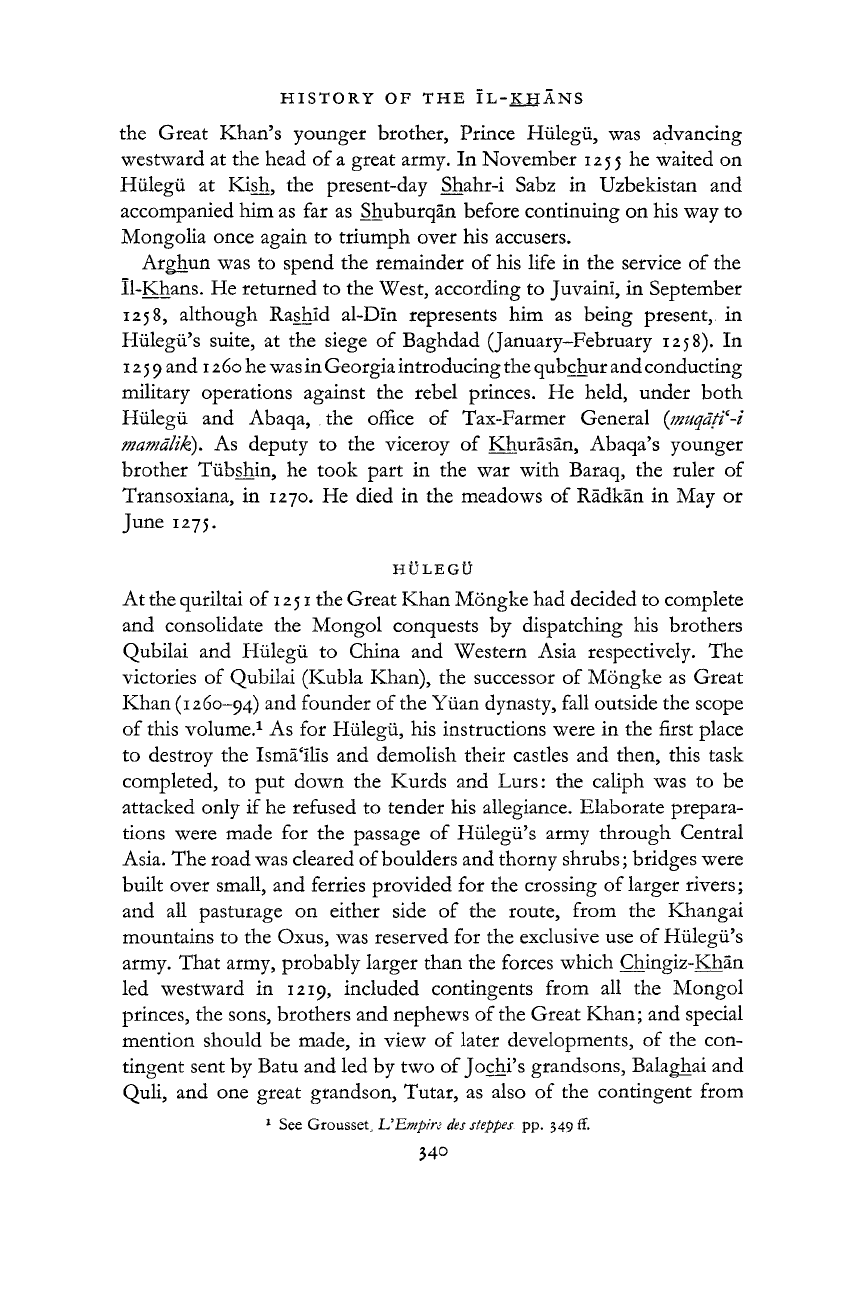
HISTORY OF THE IL -KHANS
the Great Khan's younger brother, Prince Hiilegii, was advancing
westward at the head of a great army. In November
1255
he waited on
Hiilegii at Kish, the present-day Shahr-i Sabz in Uzbekistan and
accompanied him as far as Shuburqan before continuing on his way to
Mongolia once again to triumph over his accusers.
Arghun was to spend the remainder of his life in the service of the
ll-Khans. He returned to the West, according to Juvaini, in September
1258,
although Rashid al-Dln represents him as being present, in
Hiilegii's suite, at the siege of Baghdad (January-February
1258).
In
1259
and
12 60
he was in Georgia introducing the qubchur and conducting
military operations against the rebel princes. He held, under both
Hiilegii and Abaqa,
.
the office of Tax-Farmer General (muqdtf-i
matndlik). As deputy to the viceroy of Khurasan, Abaqa's younger
brother Tiibshin, he took part in the war with Baraq, the ruler of
Transoxiana, in
1270.
He died in the meadows of Radkan in May or
June
1275.
HULEGU
At the quriltai of
12 51
the Great Khan Mongke had decided to complete
and consolidate the Mongol conquests by dispatching his brothers
Qubilai and Hiilegii to China and Western Asia respectively. The
victories of Qubilai (Kubla Khan), the successor of Mongke as Great
Khan
(1260-94)
and founder of the Yuan dynasty, fall outside the scope
of this volume.
1
As for Hiilegii, his instructions were in the first place
to destroy the Isma'ilis and demolish their castles and then, this task
completed, to put down the Kurds and Lurs: the caliph was to be
attacked only if he refused to tender his allegiance. Elaborate prepara-
tions were made for the passage of Hiilegii's army through Central
Asia. The road was cleared of boulders and thorny shrubs; bridges were
built over small, and ferries provided for the crossing of larger rivers;
and all pasturage on either side of the route, from the Khangai
mountains to the Oxus, was reserved for the exclusive use of Hiilegii's
army. That army, probably larger than the forces which Chingiz-Khan
led westward in
1219,
included contingents from all the Mongol
princes, the sons, brothers and nephews of the Great Khan; and special
mention should be made, in view of later developments, of the con-
tingent sent by Batu and led by two of Jochi's grandsons, Balaghai and
Quli, and one great grandson, Tutar, as also of the contingent from
1
See Grousset,
L՝Empire
des
steppes
pp. 349 ff.
340
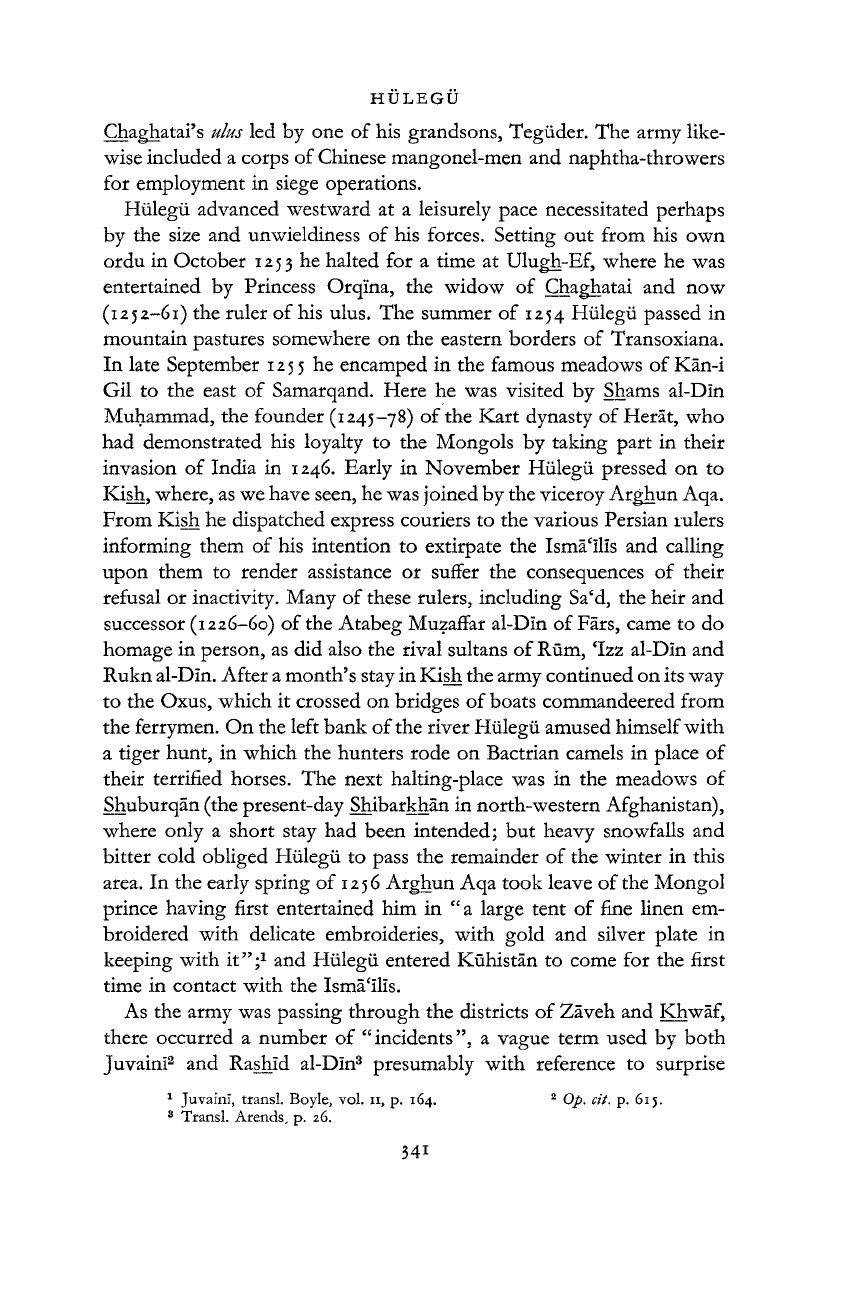
HULEGU
341
Chaghatai's ulus led by one of his grandsons, Tegiider. The army like-
wise included a corps of Chinese mangonel-men and naphtha-throwers
for employment in siege operations.
Hiilegii advanced westward at a leisurely pace necessitated perhaps
by the size and unwieldiness of his forces. Setting out from his own
ordu in October
125 3
he halted for a time at Ulugh-Ef, where he was
entertained by Princess Orqi'na, the widow of
Chaghatai and now
(1252-61)
the ruler of his ulus. The summer of
1254
Hiilegii passed in
mountain pastures somewhere on the eastern borders of Transoxiana.
In late September
1255
he encamped in the famous meadows of Kan-i
Gil to the east of Samarqand. Here he was visited by
Shams al-Dln
Muhammad, the founder
(1245-78)
of the Kart dynasty of Herat, who
had demonstrated his loyalty to the Mongols by taking part in their
invasion of India in
1246.
Early in November Hiilegii pressed on to
Kish, where, as we have seen, he was joined by the viceroy Arghun Aqa.
From Kish he dispatched express couriers to the various Persian rulers
informing them of his intention to extirpate the Isma'ilis and calling
upon them to render assistance or suffer the consequences of their
refusal or inactivity. Many of these rulers, including Sa'd, the heir and
successor
(1226-60)
of the Atabeg Muzaffar al-Dln of Fars, came to do
homage in person, as did also the rival sultans of Rum,
c
Izz al-Dln and
Rukn al-Dln. After a month's stay in Kish the army continued on its way
to the Oxus, which it crossed on bridges of boats commandeered from
the ferrymen. On the left bank of the river Hiilegii amused himself with
a tiger hunt, in which the hunters rode on Bactrian camels in place of
their terrified horses. The next halting-place was in the meadows of
Shuburqan (the present-day Shiba
rkhan in north-western Afghanistan),
where only a short stay had been intended; but heavy snowfalls and
bitter cold obliged Hiilegii to pass the remainder of the winter in this
area. In the early spring of
1256
Arghun Aqa took leave of the Mongol
prince having first entertained him in "a large tent of fine linen em-
broidered with delicate embroideries, with gold and silver plate in
keeping with it";
1
and Hiilegii entered Kuhistan to come for the first
time in contact with the Isma'ilis.
As the army was passing through the districts of Zaveh and Khwaf,
there occurred a number of "incidents", a vague term used by both
Juvaini
2
and Rashid al-Dln
3
presumably with reference to surprise
1
Juvaini, transl. Boyle, vol. n, p. 164.
2
Op. cit. p. 615.
3
Transl. Arends, p. 26.
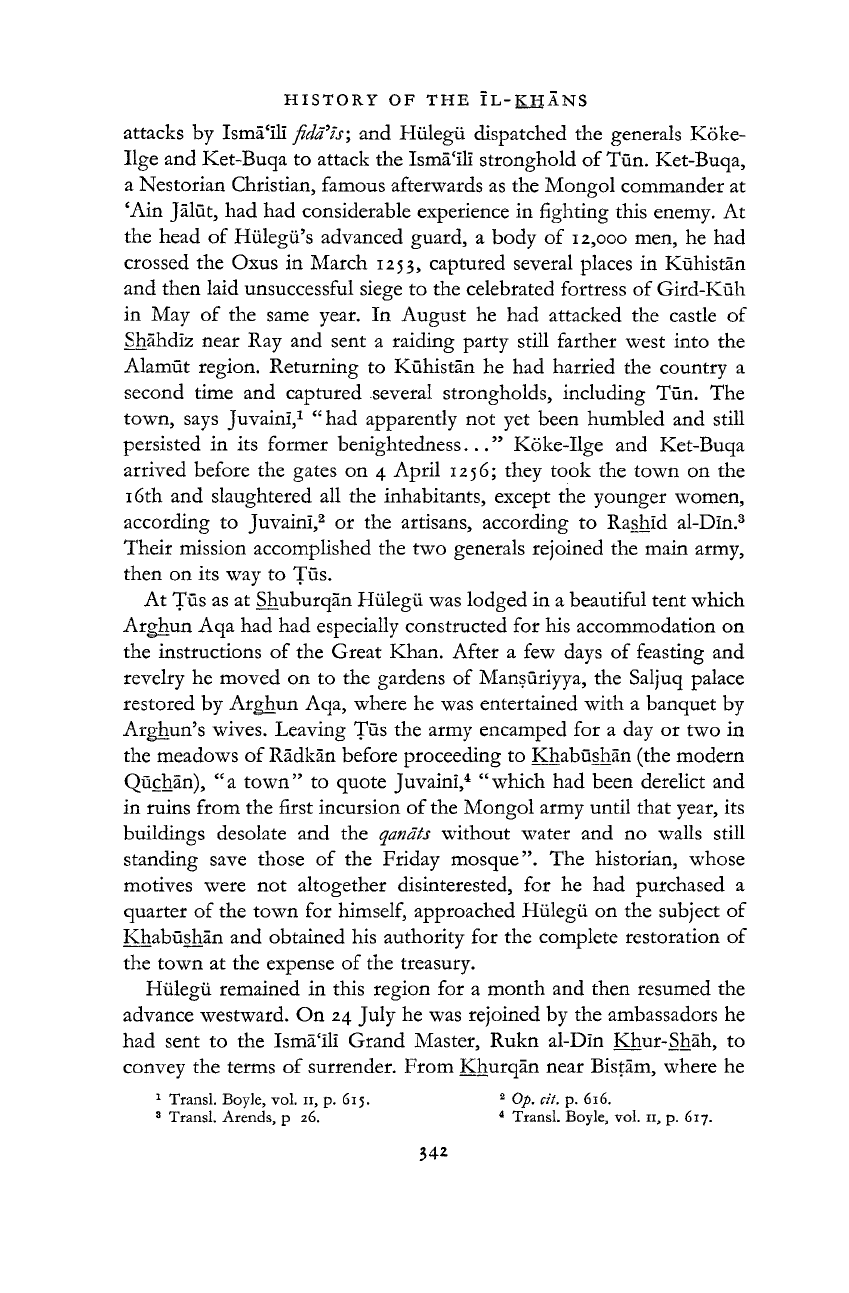
HISTORY OF THE IL-KHANS
342
attacks by Isma'lli
fidd'Is;
and Hulegii dispatched the generals Koke-
Ilge and Ket-Buqa to attack the Isma'ili stronghold of Tun. Ket-Buqa,
a Nestorian Christian, famous afterwards as the Mongol commander at
'Ain Jalut, had had considerable experience in fighting this enemy. At
the head of Hiilegii's advanced guard, a body of
12,000
men, he had
crossed the Oxus in March
1253,
captured several places in Kuhistan
and then laid unsuccessful siege to the celebrated fortress of Gird-Kuh
in May of the same year. In August he had attacked the castle of
Shahdiz near Ray and sent a raiding party still farther west into the
Alamut region. Returning to Kuhistan he had harried the country a
second time and captured several strongholds, including Tun. The
town, says Juvaini,
1
"had apparently not yet been humbled and still
persisted in its former benightedness..." Koke-Ilge and Ket-Buqa
arrived before the gates on 4 April
1256;
they took the town on the
16th
and slaughtered all the inhabitants, except the younger women,
according to Juvaini,
2
or the artisans, according to Rashid al-Din.
3
Their mission accomplished the two generals rejoined the main army,
then on its way to Tus.
At Tus as at Shuburqan Hulegii was lodged in a beautiful tent which
Ar
ghun Aqa had had especially constructed for his accommodation on
the instructions of the Great Khan. After a few days of feasting and
revelry he moved on to the gardens of Mansuriyya, the Saljuq palace
restored by Ar
ghun Aqa, where he was entertained with a banquet by
Arghun's wives. Leaving Tus the army encamped for a day or two in
the meadows of Radkan before proceeding to
Khabushan (the modern
Quchan),
"a town" to quote Juvaini,
4
"which had been derelict and
in ruins from the first incursion of the Mongol army until that year, its
buildings desolate and the qandts without water and no walls still
standing save those of the Friday mosque". The historian, whose
motives were not altogether disinterested, for he had purchased a
quarter of the town for himself, approached Hulegii on the subject of
Khabushan and obtained his authority for the complete restoration of
the town at the expense of the treasury.
Hulegii remained in this region for a month and then resumed the
advance westward. On 24 July he was rejoined by the ambassadors he
had sent to the Isma'ili Grand Master, Rukn al-Din Khur-Shah, to
convey the terms of surrender. From
Khurqan near Bistam, where he
1
Transl. Boyle, vol. 11, p. 615.
2
Op. cit. p. 616.
8
Transl. Arends, p 26.
4
Transl. Boyle, vol. 11, p. 617.
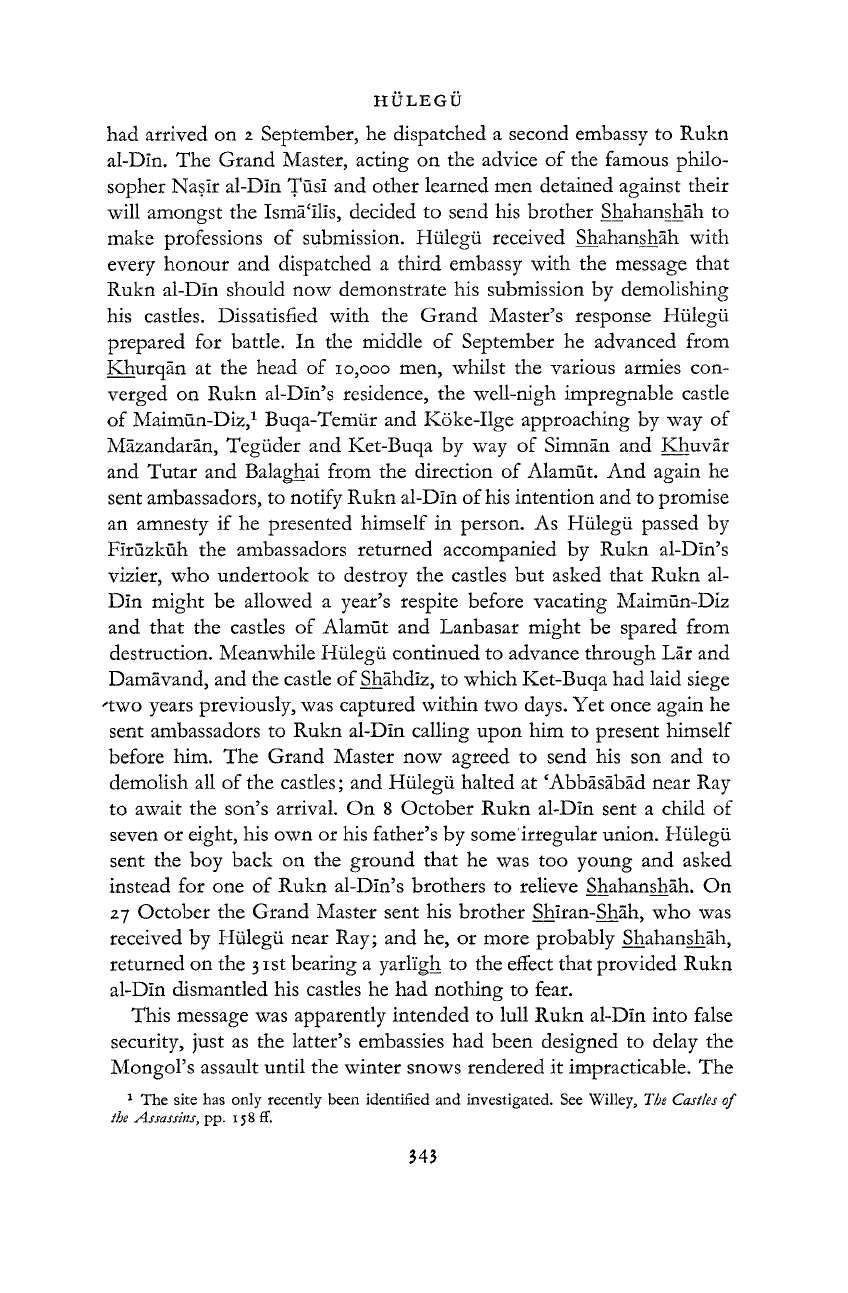
HULEGU
343
had arrived on 2 September, he dispatched a second embassy to Rukn
al-Din. The Grand Master, acting on the advice of the famous philo-
sopher Nasir al-Din Tusi and other learned men detained against their
will amongst the Isma'ilis, decided to send his brother Shahanshah to
make professions of submission. Hiilegii received Shahanshah with
every honour and dispatched a third embassy with the message that
Rukn al-Din should now demonstrate his submission by demolishing
his castles. Dissatisfied with the Grand Master's response Hiilegii
prepared for battle. In the middle of September he advanced from
Khurqan at the head of
10,000
men, whilst the various armies con-
verged on Rukn al-Dln's residence, the well-nigh impregnable castle
of Maimun-Diz,
1
Buqa-Temiir and Koke-Ilge approaching by way of
Mazandaran, Tegiider and Ket-Buqa by way of Simnan and Khuvar
and Tutar and Balaghai from the direction of Alamut. And again he
sent ambassadors, to notify Rukn al-Din of his intention and to promise
an amnesty if he presented himself in person. As Hiilegii passed by
Firiizkuh the ambassadors returned accompanied by Rukn al-Din's
vizier, who undertook to destroy the castles but asked that Rukn al-
Din might be allowed a year's respite before vacating Maimun-Diz
and that the castles of Alamut and Lanbasar might be spared from
destruction. Meanwhile Hiilegii continued to advance through Lar and
Damavand, and the castle of Shahdiz, to which Ket-Buqa had laid siege
''two years previously, was captured within two days. Yet once again he
sent ambassadors to Rukn al-Din calling upon him to present himself
before him. The Grand Master now agreed to send his son and to
demolish all of the castles; and Hiilegii halted at 'Abbasabad near Ray
to await the son's arrival. On 8 October Rukn al-Din sent a child of
seven or eight, his own or his father's by some irregular union. Hiilegii
sent the boy back on the ground that he was too young and asked
instead for one of Rukn al-Din's brothers to relieve Shahanshah. On
27
October the Grand Master sent his brother Shiran-Shah, who was
received by Hiilegii near Ray; and he, or more probably
Shahanshah,
returned on the
31st
bearing a yarligh to the effect that provided Rukn
al-Din dismantled his castles he had nothing to fear.
This message was apparently intended to lull Rukn al-Din into false
security, just as the latter's embassies had been designed to delay the
Mongol's assault until the winter snows rendered it impracticable. The
1
The site has only recently been identified and investigated. See Willey, The Castles of
the Assassins, pp.
15 8
ff.
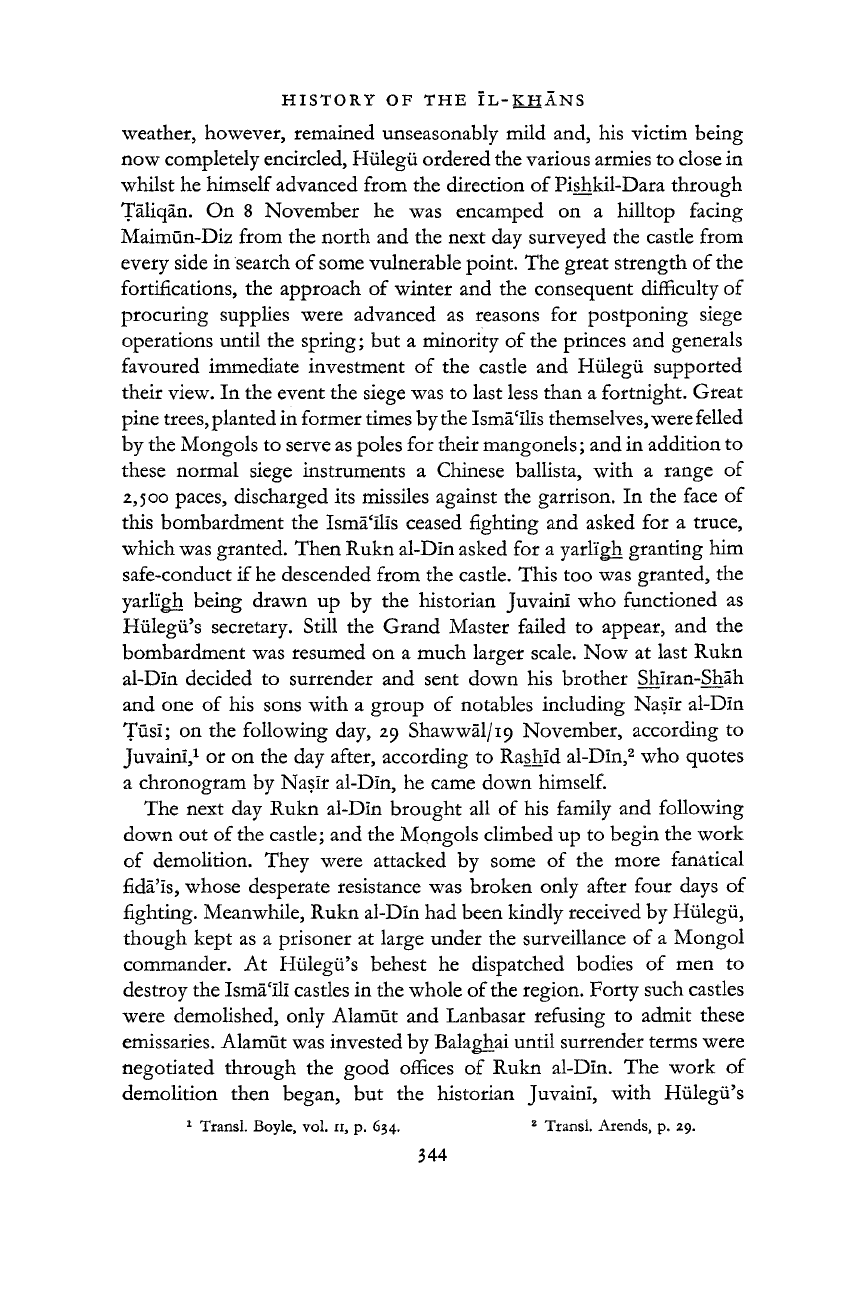
HISTORY
OF THE IL-KHANS
344
weather, however, remained unseasonably mild and, his victim being
now completely encircled, Hiilegu ordered the various armies to close in
whilst he himself advanced from the direction of Pishkil-Dara through
Taliqan. On 8 November he was encamped on a hilltop facing
Maimun-Diz from the north and the next day surveyed the castle from
every side in search of some vulnerable point. The great strength of the
fortifications, the approach of winter and the consequent difficulty of
procuring supplies were advanced as reasons for postponing siege
operations until the spring; but a minority of the princes and generals
favoured immediate investment of the castle and Hulegii supported
their view. In the event the siege was to last less than a fortnight. Great
pine trees, planted in former times by the Isma'ilis themselves, were felled
by the Mongols to serve as poles for their mangonels; and in addition to
these normal siege instruments a Chinese ballista, with a range of
2,500 paces, discharged its missiles against the garrison. In the face of
this bombardment the Isma'ills ceased fighting and asked for a truce,
which was granted. Then Rukn al-Din asked for a yarli
gh granting him
safe-conduct if he descended from the castle. This too was granted, the
yarli
gh being drawn up by the historian Juvaini who functioned as
Hiilegii's secretary. Still the Grand Master failed to appear, and the
bombardment was resumed on a much larger scale. Now at last Rukn
al-Din decided to surrender and sent down his brother Shiran-Shah
and one of his sons with a group of notables including Nasir al-Din
Tusi; on the following day, 29
Shawwal/19
November, according to
Juvaini,
1
or on the day after, according to Rashid al-Din,
2
who quotes
a chronogram by Nasir al-Din, he came down himself.
The next day Rukn al-Din brought all of his family and following
down out of the castle; and the Mongols climbed up to begin the work
of demolition. They were attacked by some of the more fanatical
fida'is, whose desperate resistance was broken only after four days of
fighting. Meanwhile, Rukn al-Din had been kindly received by Hiilegii,
though kept as a prisoner at large under the surveillance of a Mongol
commander. At Hiilegii's behest he dispatched bodies of men to
destroy the Isma'ili castles in the whole of the region. Forty such castles
were demolished, only Alamiit and Lanbasar refusing to admit these
emissaries. Alamut was invested by Balaghai until surrender terms were
negotiated through the good offices of Rukn al-Din. The work of
demolition then began, but the historian Juvaini, with Hiilegii's
1
Transl. Boyle, vol. 11, p. 634.
2
Transl. Arends, p. 29.
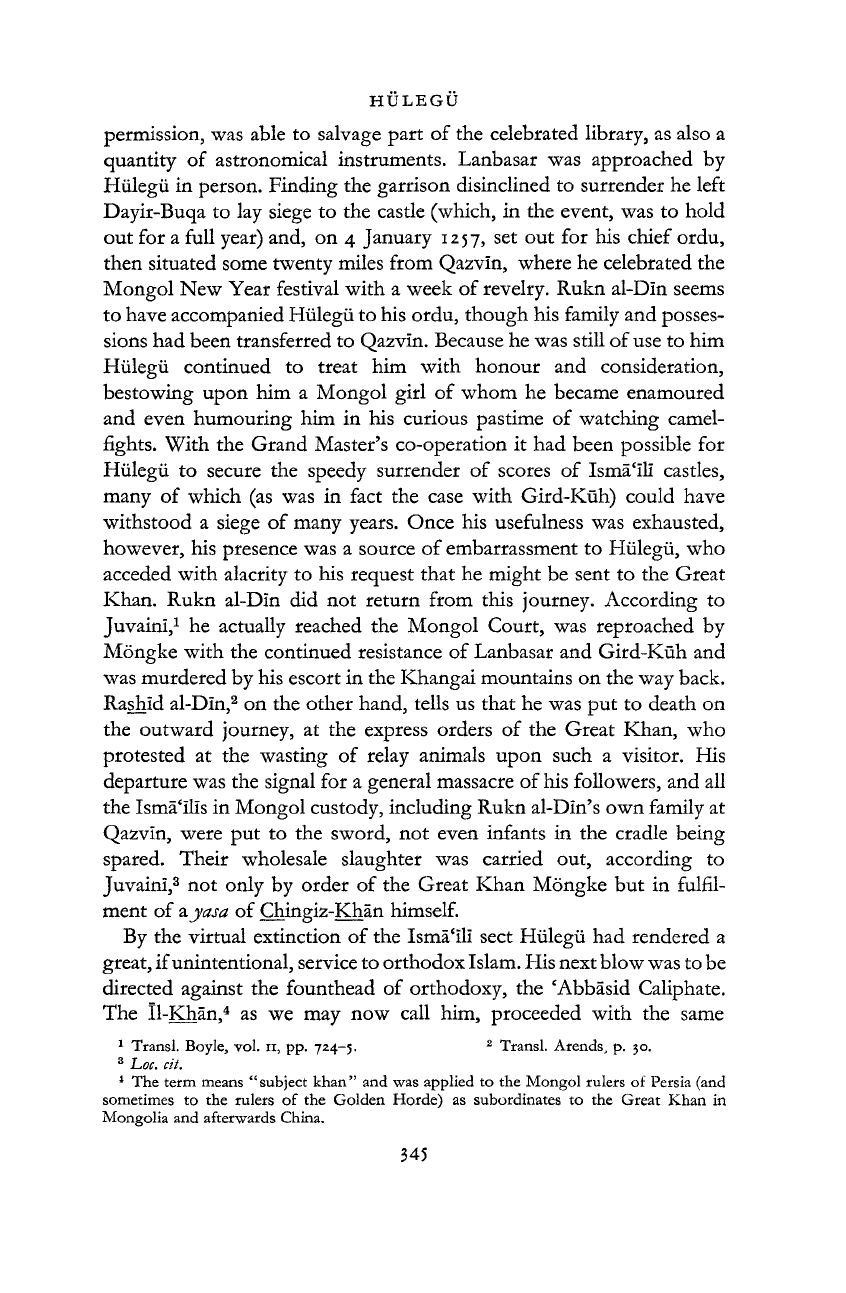
HULEGU
345
permission, was able to salvage part of the celebrated library, as also a
quantity of astronomical instruments. Lanbasar was approached by
Hiilegii in person. Finding the garrison disinclined to surrender he left
Dayir-Buqa to lay siege to the castle (which, in the event, was to hold
out for a full year) and, on 4 January
1257,
set out for his chief ordu,
then situated some twenty miles from Qazvln, where he celebrated the
Mongol New Year festival with a week of revelry. Rukn al-Dln seems
to have accompanied Hiilegu to his ordu, though his family and posses-
sions had been transferred to Qazvin. Because he was still of use to him
Hiilegii continued to treat him with honour and consideration,
bestowing upon him a Mongol girl of whom he became enamoured
and even humouring him in his curious pastime of watching camel-
fights. With the Grand Master's co-operation it had been possible for
Hiilegii to secure the speedy surrender of scores of Isma'ill castles,
many of which (as was in fact the case with Gird-Kuh) could have
withstood a siege of many years. Once his usefulness was exhausted,
however, his presence was a source of embarrassment to Hiilegii, who
acceded with alacrity to his request that he might be sent to the Great
Khan. Rukn al-Dln did not return from this journey. According to
Juvaini,
1
he actually reached the Mongol Court, was reproached by
Mongke with the continued resistance of Lanbasar and Gird-Kuh and
was murdered by his escort in the Khangai mountains on the way back.
Rashid al-Dln,
2
on the other hand, tells us that he was put to death on
the outward journey, at the express orders of the Great Khan, who
protested at the wasting of relay animals upon such a visitor. His
departure was the signal for a general massacre of his followers, and all
the Isma'llls in Mongol custody, including Rukn al-Dln's own family at
Qazvin, were put to the sword, not even infants in the cradle being
spared. Their wholesale slaughter was carried out, according to
Juvaini,
3
not only by order of the Great Khan Mongke but in fulfil-
ment of ayasa of Chingiz-Khan himself.
By the virtual extinction of the Isma'ili sect Hiilegii had rendered a
great, if unintentional, service to orthodox Islam. His next blow was to be
directed against the founthead of orthodoxy, the 'Abbasid Caliphate.
The Il-Khan,
4
as we may now call him, proceeded with the same
1
Transl. Boyle, vol. 11, pp. 724-5.
2
Transl. Arends, p. 30.
3
Loc. tit.
* The term means "subject khan" and was applied to the Mongol rulers of Persia (and
sometimes to the rulers of the Golden Horde) as subordinates to the Great Khan in
Mongolia and afterwards China.
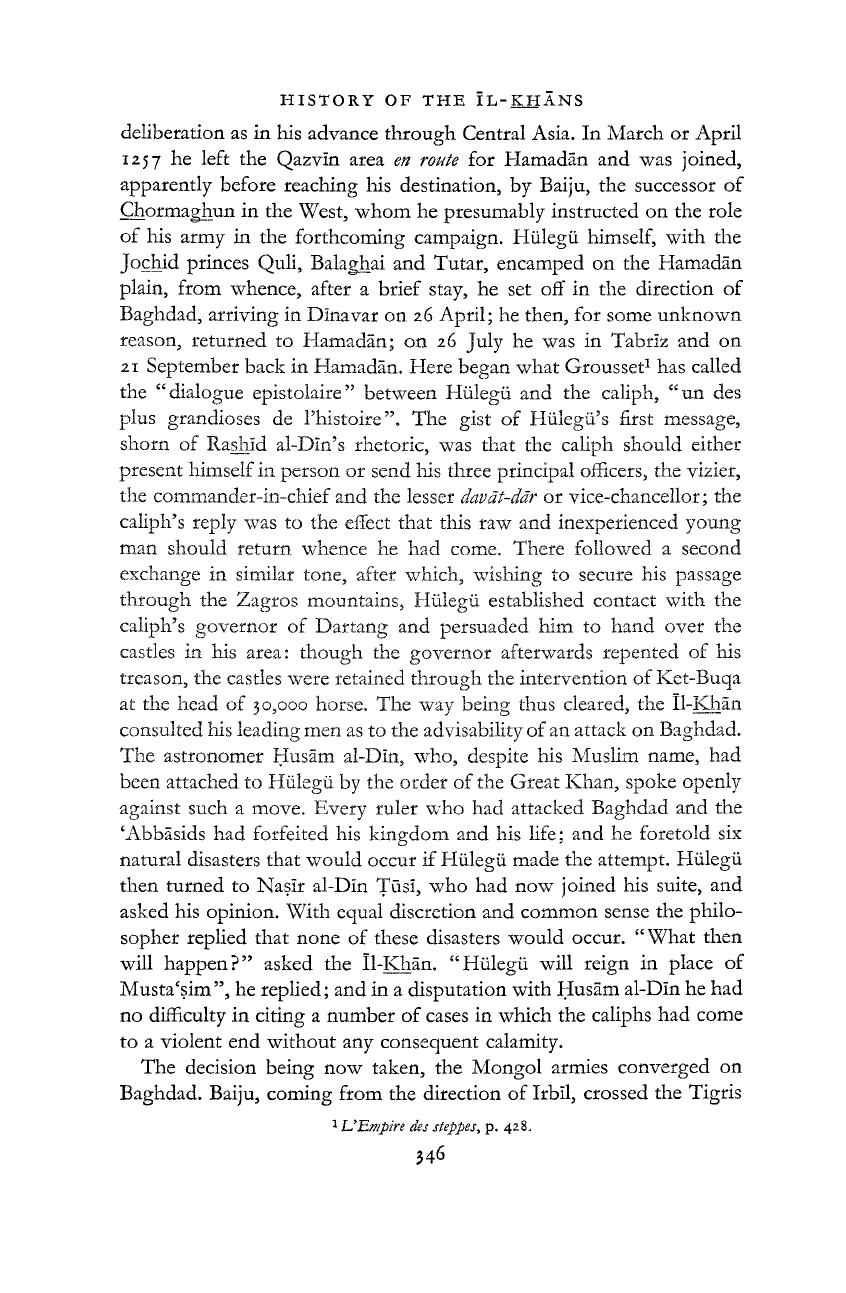
HISTORY OF THE IL-KHANS
deliberation as in his advance through Central Asia. In March or April
1257
he left the Qazvin area en route for Hamadan and was joined,
apparently before reaching his destination, by Baiju, the successor of
Chormaghun in the West, whom he presumably instructed on the role
of his army in the forthcoming campaign. Hulegii himself, with the
Jochid princes Quli, Balaghai and Tutar, encamped on the Hamadan
plain, from whence, after a brief stay, he set off in the direction of
Baghdad, arriving in Dinavar on
26
April; he then, for some unknown
reason, returned to Hamadan; on 26 July he was in Tabriz and on
21
September back in Hamadan. Here began what Grousset
1
has called
the " dialogue epistolaire" between Hiilegii and the caliph, "un des
plus grandioses de l'histoire". The gist of Hiilegii's
first
message,
shorn of Rashid al-Din's rhetoric, was that the caliph should either
present himself in person or send his three principal officers, the vizier,
the commander-in-chief and the lesser davdt-ddr or vice-chancellor; the
caliph's reply was to the
effect
that this raw and inexperienced young
man should return whence he had come. There followed a second
exchange in similar tone, after which, wishing to secure his passage
through the
Zagros
mountains, Hiilegii established contact with the
caliph's governor of Dartang and persuaded him to hand over the
castles in his area: though the governor afterwards repented of his
treason, the castles were retained through the intervention of Ket-Buqa
at the head of 30,000 horse. The way being thus cleared, the Il-Khan
consulted his leading men as to the advisability of an attack on Baghdad.
The astronomer Husam al-Din, who, despite his Muslim name, had
been attached to Hiilegii by the order of the Great Khan, spoke openly
against such a move. Every ruler who had attacked Baghdad and the
'Abbasids had forfeited his kingdom and his life; and he foretold six
natural disasters that would occur if Hiilegii made the attempt. Hulegii
then turned to Nasir al-Din Tusi, who had now joined his suite, and
asked his opinion. With equal discretion and common sense the philo-
sopher replied that none of these disasters would occur. " What then
will happen ?" asked the Il-Khan. " Hiilegii will reign in place of
Musta'sim", he replied; and in a disputation with Husam al-Din he had
no difficulty in citing a number of cases in which the caliphs had come
to a violent end without any consequent calamity.
The decision being now taken, the Mongol armies converged on
Baghdad. Baiju, coming from the direction of Irbil, crossed the Tigris
1
U Empire des
steppes,
p. 428.
346
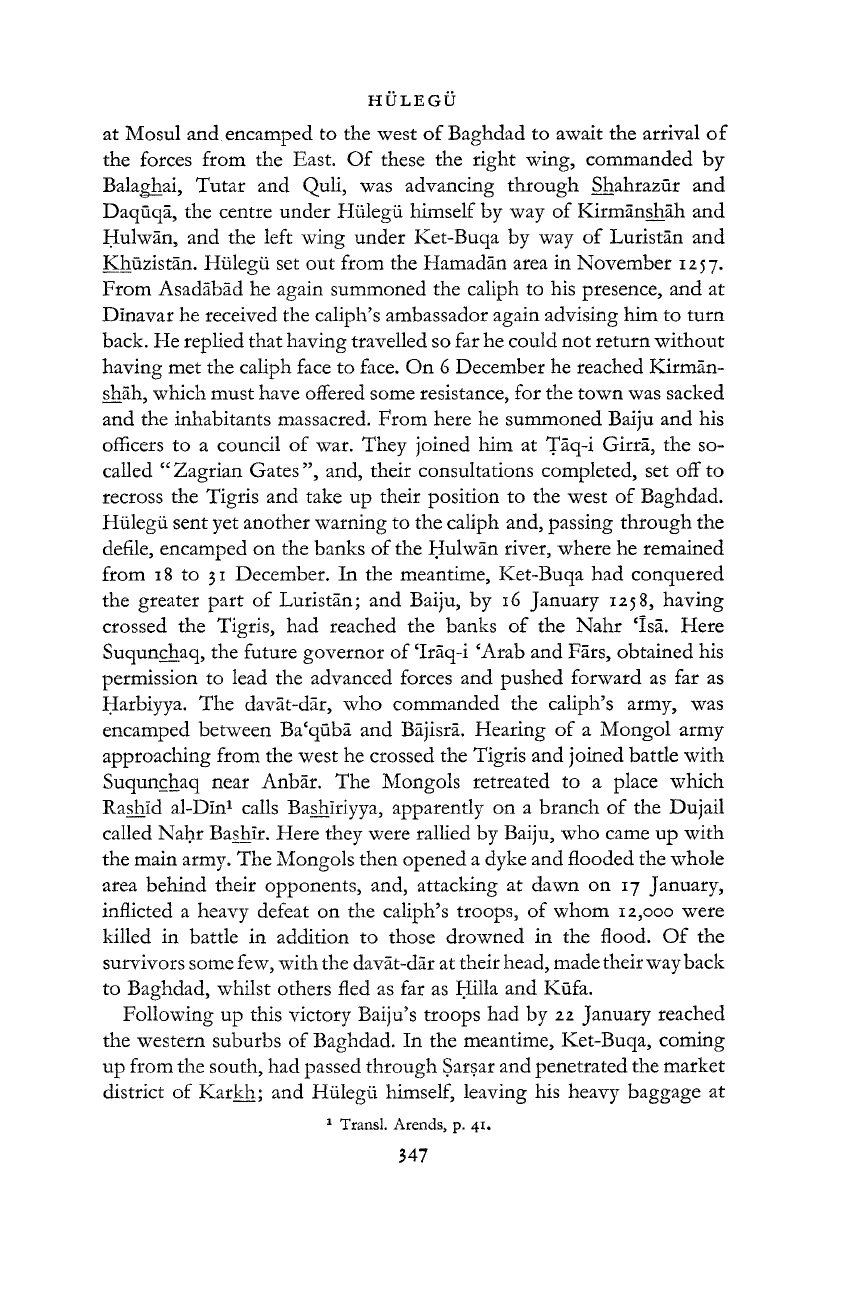
HULEGU
347
at Mosul and encamped to the west of Baghdad to await the arrival of
the forces from the East. Of these the right wing, commanded by
Balaghai, Tutar and Quli, was advancing through Shahrazur and
Daquqa, the centre under Hiilegii himself by way of Kirmanshah and
Hulwan, and the left wing under Ket-Buqa by way of Luristan and
Khuzistan. Hiilegii set out from the Hamadan area in November
1257.
From Asadabad he again summoned the caliph to his presence, and at
Dinavar he received the caliph's ambassador again advising him to turn
back. He replied that having travelled so far he could not return without
having met the caliph face to face. On 6 December he reached Kirman-
shah, which must have offered some resistance, for the town was sacked
and the inhabitants massacred. From here he summoned Baiju and his
officers to a council of war. They joined him at Taq-i Girra, the so-
called " Zagrian Gates ", and, their consultations completed, set off to
recross the Tigris and take up their position to the west of Baghdad.
Hiilegu sent yet another warning to the caliph and, passing through the
defile,
encamped on the banks of the Hulwan river, where he remained
from 18 to 31 December. In the meantime, Ket-Buqa had conquered
the greater part of Luristan; and Baiju, by 16 January
1258,
having
crossed the Tigris, had reached the banks of the Nahr 'Isa. Here
Suqunchaq, the future governor of
c
Iraq-i "Arab and Fars, obtained his
permission to lead the advanced forces and pushed forward as far as
Harbiyya. The davat-dar, who commanded the caliph's army, was
encamped between Ba'quba and Bajisra. Hearing of a Mongol army
approaching from the west he crossed the Tigris and joined battle with
Suqunchaq near Anbar. The Mongols retreated to a place which
Rashid al-Din
1
calls Bashiriyya, apparently on a branch of the Dujail
called Nahr Bashir. Here they were rallied by Baiju, who came up with
the main army. The Mongols then opened a dyke and flooded the whole
area behind their opponents, and, attacking at dawn on 17 January,
inflicted a heavy defeat on the caliph's troops, of whom
12,000
were
killed in battle in addition to those drowned in the flood. Of the
survivors some few, with the davat-dar at their head, made their way back
to Baghdad, whilst others fled as far as Hilla and Kiifa.
Following up this victory Baiju's troops had by 22 January reached
the western suburbs of Baghdad. In the meantime, Ket-Buqa, coming
up from the south, had passed through Sarsar and penetrated the market
district of Karkh; and Hiilegu himself, leaving his heavy baggage at
1
Transl. Arends, p. 41.
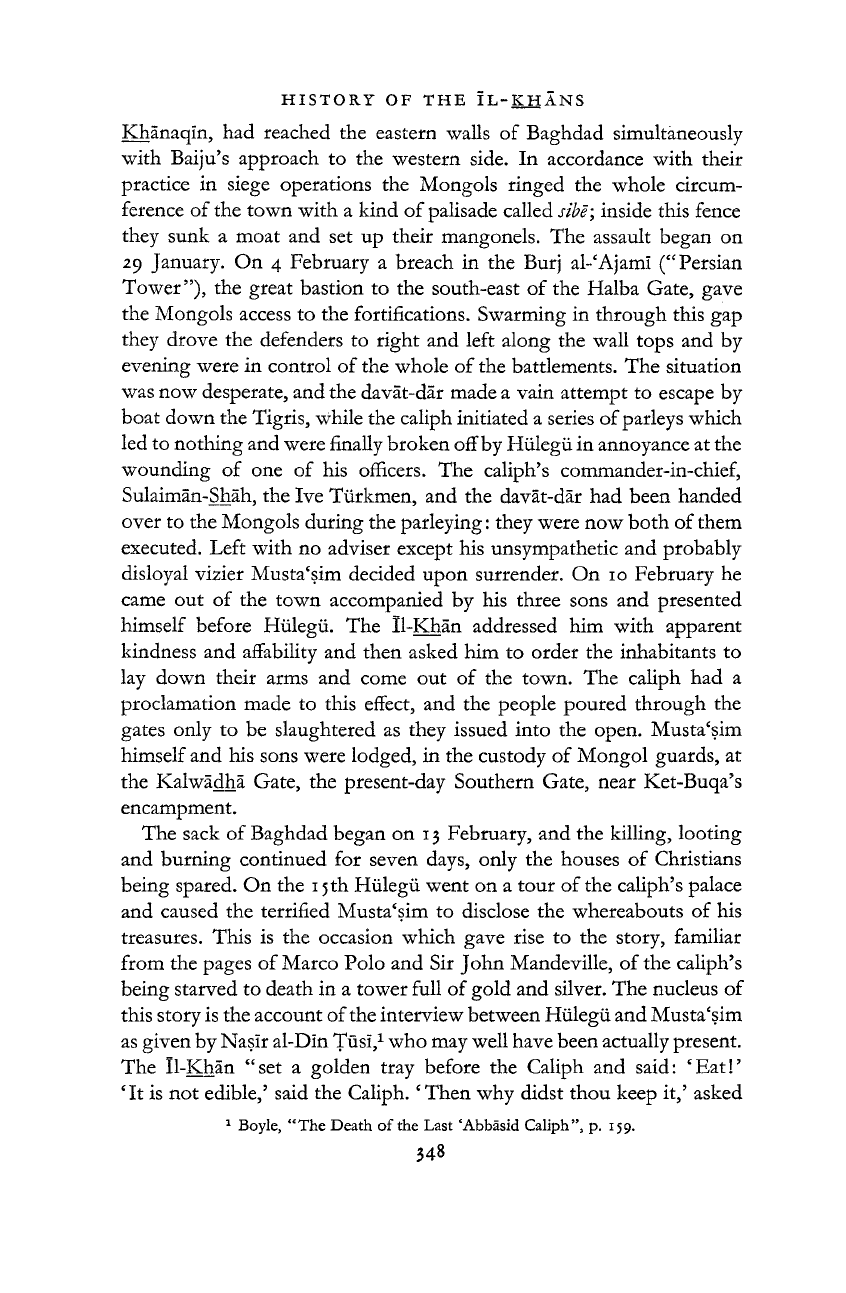
HISTORY OF THE İL-KHÂNS
Khanaqin, had reached the eastern walls of Baghdad simultaneously
with Baiju's approach to the western side. In accordance with their
practice in siege operations the Mongols ringed the whole circum-
ference of the town with a kind of palisade called
sibe;
inside this fence
they sunk a moat and set up their mangonels. The assault began on
29
January. On 4 February a breach in the Burj al-'Ajami ("Persian
Tower"),
the great bastion to the south-east of the Halba Gate, gave
the Mongols access to the fortifications. Swarming in through this gap
they drove the defenders to right and left along the wall tops and by
evening were in control of the whole of the battlements. The situation
was now desperate, and the
davât-dâr made a vain attempt to escape by
boat down the Tigris, while the caliph initiated a series of parleys which
led to nothing and were finally broken off by Hulegii in annoyance at the
wounding of one of his officers. The caliph's commander-in-chief,
Sulaimân-Şhâh, the ive Türkmen, and the davât-dâr had been handed
over to the Mongols during the parleying: they were now both of them
executed. Left with no adviser except his unsympathetic and probably
disloyal vizier Musta'şim decided upon surrender. On 10 February he
came out of the town accompanied by his three sons and presented
himself before Hiilegii. The
Il-Khân addressed him with apparent
kindness and affability and then asked him to order the inhabitants to
lay down their arms and come out of the town. The caliph had a
proclamation made to this effect, and the people poured through the
gates only to be slaughtered as they issued into the open. Musta'sim
himself and his sons were lodged, in the custody of Mongol guards, at
the Kalwadha Gate, the present-day Southern Gate, near Ket-Buqa's
encampment.
The sack of Baghdad began on 13 February, and the killing, looting
and burning continued for seven days, only the houses of Christians
being spared. On the
15
th Hiilegii went on a tour of the caliph's palace
and caused the terrified Musta'sim to disclose the whereabouts of his
treasures. This is the occasion which gave rise to the story, familiar
from the pages of Marco Polo and Sir John Mandeville, of the caliph's
being starved to death in a tower full of gold and silver. The nucleus of
this story is the account of the interview between Hiilegii and
Musta'şim
as given by Naşir al-Din Tüsi,
1
who may well have been actually present.
The Il-
Khân "set a golden tray before the Caliph and said: 'Eat!'
'It is not edible,' said the Caliph. 'Then why didst thou keep it,' asked
1
Boyle, "The Death of the Last 'Abbâsid Caliph", p. 159.
348
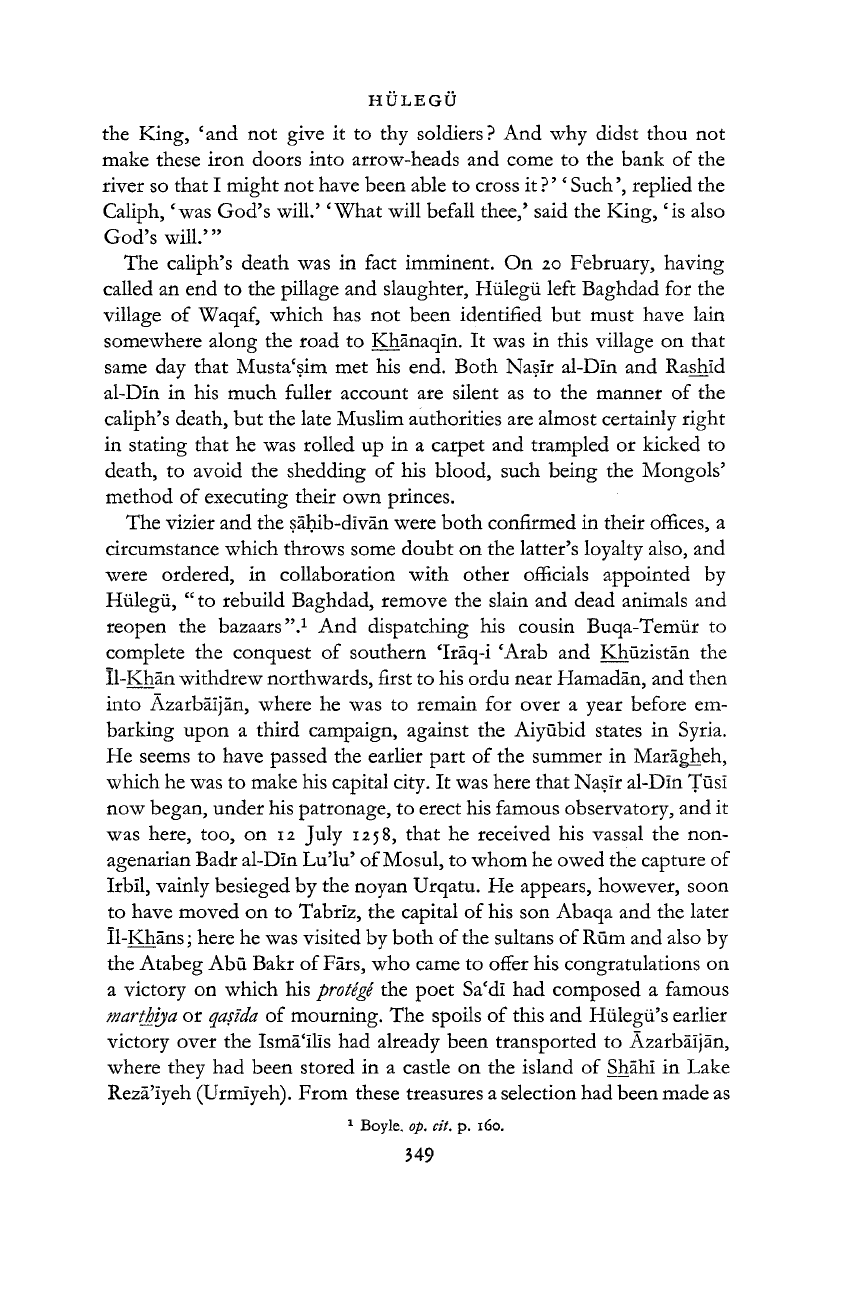
HÜLEGÜ
the King, 'and not give it to thy soldiers? And why didst thou not
make these iron doors into arrow-heads and come to the bank of the
river so that I might not have been able to cross it ?' ' Such replied the
Caliph, "was God's will' 'What will befall thee,' said the King, 'is also
God's will.'"
The caliph's death was in fact imminent. On 20 February, having
called an end to the pillage and slaughter, Hiilegu left Baghdad for the
village of Waqaf, which has not been identified but must have lain
somewhere along the road to
Khânaqïn. It was in this village on that
same day that Musta'şim met his end. Both Naşir al-Din and Raşhid
al-Din in his much fuller account are silent as to the manner of the
caliph's death, but the late Muslim authorities are almost certainly right
in stating that he was rolled up in a carpet and trampled or kicked to
death, to avoid the shedding of his blood, such being the Mongols'
method of executing their own princes.
The vizier and the şâhib-divân were both confirmed in their offices, a
circumstance which throws some doubt on the latter's loyalty also, and
were ordered, in collaboration with other officials appointed by
Hiilegii, "to rebuild Baghdad, remove the slain and dead animals and
reopen the bazaars".
1
And dispatching his cousin Buqa-Temur to
complete the conquest of southern 'Iraq-i 'Arab and Khûzistân the
Il-Khân withdrew northwards, first to his ordu near Hamadan, and then
into Âzarbâijân, where he was to remain for over a year before em-
barking upon a third campaign, against the Aiyübid states in Syria.
He seems to have passed the earlier part of the summer in
Marâgheh,
which he was to make his capital city. It was here that Naşir al-Din Tüsi
now began, under his patronage, to erect his famous observatory, and it
was here, too, on 12 July
1258,
that he received his vassal the non-
agenarian Badr al-Din Lu'lu' of Mosul, to whom he owed the capture of
Irbil, vainly besieged by the noyan Urqatu. He appears, however, soon
to have moved on to Tabriz, the capital of his son Abaqa and the later
Il-Khâns ; here he was visited by both of the sultans of Rum and also by
the Atabeg Abu Bakr of
Fars, who came to offer his congratulations on
a victory on which his
protege
the poet Sa'di had composed a famous
marthiya or qasïda of mourning. The spoils of this and Hiilegii's earlier
victory over the
Ismâ'ïlïs had already been transported to Âzarbâijân,
where they had been stored in a castle on the island of Shâhi in Lake
Reza'iyeh (Urmiyeh). From these treasures a selection had been made as
1
Boyle, op. cit. p. 160.
349
